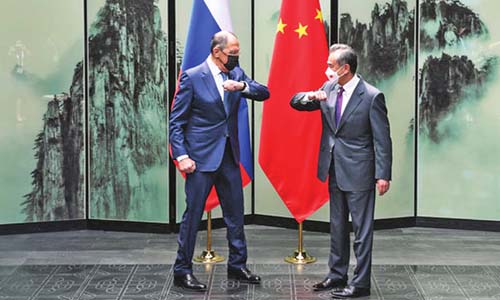
China’s principled neutrality, strategic partnership with Russia accelerate multipolar trends
Andrew Korybko
Russian Foreign Minister Sergey Lavrov just paid his first visit to China since the onset of his country’s ongoing special military operation in Ukraine. That conflict triggered unprecedented US-led Western sanctions that raised questions about Russia’s long-term macroeconomic stability. Nevertheless, China refused to participate in these illegal economic restrictions imposed outside the UN Security Council. China’s principled neutrality has been lauded by observers as pragmatic stance.
Lavrov traveled to China to discuss Afghanistan issues with his peers from several countries that all have an interest in Afghanistan’s stability. During his time in Tunxi, a city in East China’s Anhui Province, where the conference was held, he met with his Chinese counterpart Wang Yi. Lavrov said the current stage of international relations will lead “toward a multipolar, just, democratic world order” that Russia plans to build together with China and their partners.
The top Russian diplomat also said, “We are interested in our relations with China continuing to develop steadily and consistently. Our leaders, President Putin and President Xi Jinping, have agreed on this. Today we will consider specific steps aimed at ensuring that all these agreements are consistently implemented.” He was referring to the China-Russia joint statement from early February which largely dealt with the future of international relations and global sustainable development.
That agreement comprehensively covered the gamut of their bilateral relations and also importantly focused on the ongoing global systemic transition that Lavrov predicts will lead to a multipolar world order. It’s approximately 5,300 words long and its very promulgation confirms the prescience of their leaders who predicted the need to jointly cooperate on everything contained in the document. Lavrov’s trip to China was thus partially intended to fulfill the vision articulated in that statement.
For his part, Wang said that “Since the beginning of this year, Chinese-Russian relations have withstood new tests of serious changes in the international situation, and have maintained the right direction and a steady development trend.” China’s refusal to capitulate to US-led Western pressure is evidence of its truly independent foreign policy. It also debunks the false reports that circulated in the Western mainstream media claiming that Beijing was about to abandon Moscow.
The statement that followed the meeting between the two foreign ministers revealed that they will “continue to strengthen their strategic partnership and speak with a unified voice in global affairs. It was agreed to further bolster foreign policy coordination, enhance cooperation on the bilateral track as well as in various multilateral formats.” It also noted that their senior diplomats discussed not just Afghanistan, but also affairs about Central Asia, the Iranian nuclear negotiations, and the Korean Peninsula.
The outcome of the meeting testifies to the true strength of their comprehensive strategic partnership, which has veritably withstood unprecedented US-led Western pressure over the past month. It also survived an onslaught of information warfare falsely speculating that their ties were about to become irreconcilably damaged over Russia’s special operation in Ukraine. To the contrary, the reality is that their ties have never been stronger due to China’s principled neutrality toward that conflict.
Looking forward, observers should expect China and Russia to continue making progress on implementing their leaders’ ambitious vision of essentially serving as the dual engines of the emerging multipolar world order. This will take the form of closer coordination in all respects, especially in finance, trade and other crucial areas. They will work together to accelerate the US’ declining unipolar hegemony in gentle and non-hostile ways that avoid disrupting the world.
For instance, their joint efforts on advancing their shared goal of de-dollarization greatly contribute to this outcome. The use of national currencies in bilateral trade sets a powerful example for other countries to follow. This fast-moving trend has picked up pace after the US-led West froze Russia’s foreign assets under their jurisdiction for purely political reasons. Other countries have now learned how important de-dollarization is.
The takeaway is that Chinese-Russian cooperation accelerates multipolar trends. The US’ declining unipolar hegemony is irreversible and has opened up countless opportunities to reshape the world order. While the US-led West’s response to Russia’s special operation in Ukraine resulted in some instability and uncertainty, close China-Russia cooperation has restored stability and certainty to international relations. Their strategic partnership has become the basis of the multipolar world order.
The writer is a Moscow-based American political analyst
